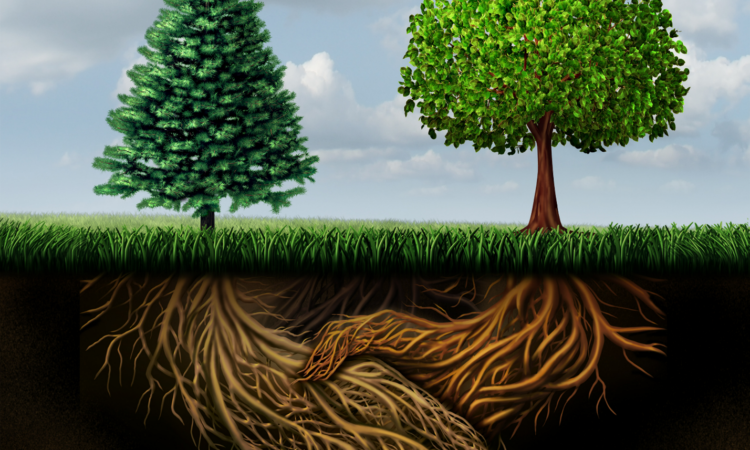By Dr. Paul Zung
Suzanne Simard has produced research that has drawn our attention to how trees communicate with each other and share resources. We have learned that tree roots are interwoven with the delicate threads of fungal mycelium to form a vast underground network. Through this mycorrhizal network, trees exchange water, nutrients, and information about the environment. It is all happening right underneath our feet, below the forest floor.
If you are new to this idea, please watch the short video link below summarizing what we have learned in the last few decades.
It’s hard to resist seeing the trees as a metaphor for human society: These silent giants care for and communicate with each other just as families and communities do!
I don’t wish to press that resemblance too far or the research evidence beyond its scope. But I want to say that people genuinely have something to learn from how trees behave. It was after learning about the trees that I began to consider that I was looking at human society the wrong way. My Western upbringing has caused me to think of individual persons in isolation. The tendency to focus on one’s success, hard work, reputation, popularity or the health of one’s own body are all examples of this preoccupation. This preoccupation brings anxiety because we are never sure when we may lose these benefits. However, a little reflection makes it evident that who I truly am is not my own achievement.
Relationships with my parents and sisters formed my identity and relationship patterns, then later on with my closer friends. Others are the matrix of my identity. Likewise, my body was nourished by the work of farmers, food producers, and the natural environment around me. The beauty and interdependence that I see in human cultures and the natural world, as well as the disruptive elements that threaten their harmony and survival, are things that I could not have appreciated on my own. They are only possible because of my interaction with teachers, writers, and other learners discussing knowledge that came to us over thousands of years. Because the richness of my life depends on the work of so many others and the physical world, doesn’t it make sense that I should better understand my life as a web of relationships with others and with nature? –And the joy of living is precisely in my capacity to enrich the lives of others, whether through the sharing of thoughts or food – whether looking after the emotional needs of others or caring for their health.
If this is a more authentic view of human life, then the quality of my relationships mirrors the quality of my life. My bond with my children becomes more important than their achievements. The care I give and receive from others is more fundamental to my happiness than surplus material wealth or status. It matters more that I touched you with my song than how well I sang. Caring for you means caring for those you love and enriching your relationships with them. And it is more crucial to my life purpose that my relationship with you points you toward our Creator than the possibility that you think well of me.
What, then, can we learn from the trees of the forest?
Like them, we are nodes within a web of relationships– not just individuals in isolation. We belong to each other.
“We will speak the truth in love, growing in every way more and more like Christ, who is the head of his body, the church. He makes the whole body fit together perfectly. As each part does its own special work, it helps the other parts grow, so that the whole body is healthy and growing and full of love.” Ephesians 4:15-16
”Let your roots grow down into him, and let your lives be built on him. Then your faith will grow strong in the truth you were taught, and you will overflow with thankfulness.”
Colossians 2:7
Reference:
www.nationalforests.org/blog/underground-mycorrhizal-network
www.ted.com/talks/suzanne_simard_how_trees_talk_to_each_other?language=en
www.scientificamerican.com/article/do-trees-support-each-other-through-a-network-of-fungi/
——————————————————————————————————————————-
Dr. Paul Zung is a Senior Dentist who has served the psychiatric and addictions population for over 35 years. He has studied counseling and is interested in the intersection of psychology and spirituality.

